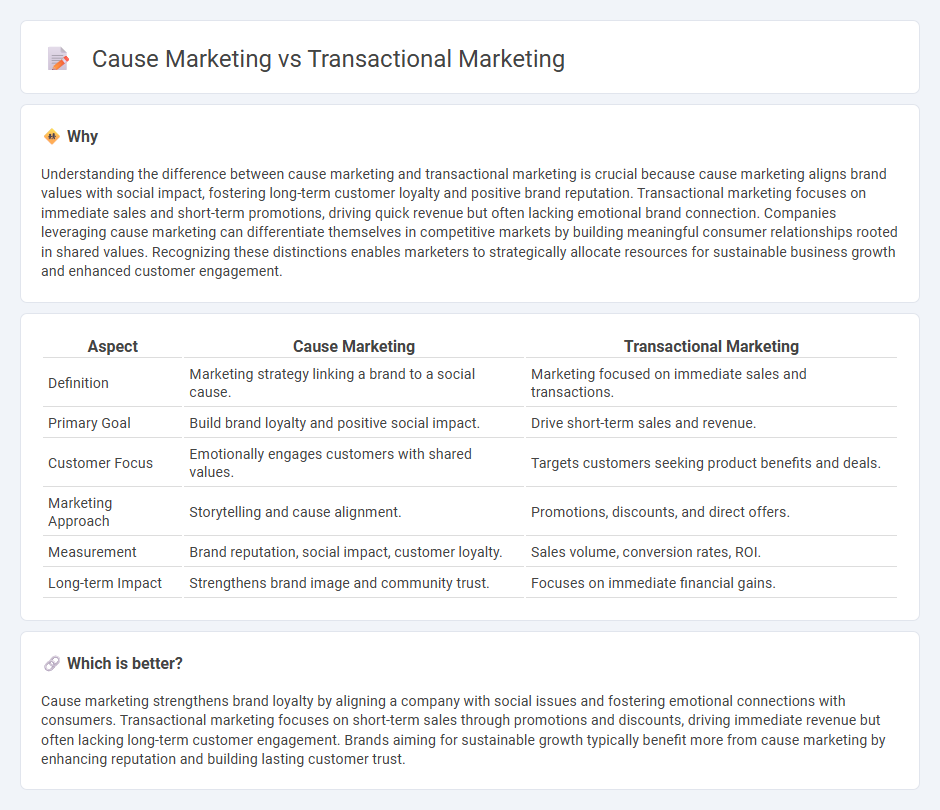
Cause marketing aligns brand campaigns with social or environmental causes to build emotional connections and enhance corporate social responsibility. Transactional marketing focuses on direct sales and promotional strategies aimed at driving immediate consumer purchases. Explore how these marketing approaches influence customer loyalty and brand perception.
Why it is important
Understanding the difference between cause marketing and transactional marketing is crucial because cause marketing aligns brand values with social impact, fostering long-term customer loyalty and positive brand reputation. Transactional marketing focuses on immediate sales and short-term promotions, driving quick revenue but often lacking emotional brand connection. Companies leveraging cause marketing can differentiate themselves in competitive markets by building meaningful consumer relationships rooted in shared values. Recognizing these distinctions enables marketers to strategically allocate resources for sustainable business growth and enhanced customer engagement.
Comparison Table
| Aspect | Cause Marketing | Transactional Marketing |
|---|---|---|
| Definition | Marketing strategy linking a brand to a social cause. | Marketing focused on immediate sales and transactions. |
| Primary Goal | Build brand loyalty and positive social impact. | Drive short-term sales and revenue. |
| Customer Focus | Emotionally engages customers with shared values. | Targets customers seeking product benefits and deals. |
| Marketing Approach | Storytelling and cause alignment. | Promotions, discounts, and direct offers. |
| Measurement | Brand reputation, social impact, customer loyalty. | Sales volume, conversion rates, ROI. |
| Long-term Impact | Strengthens brand image and community trust. | Focuses on immediate financial gains. |
Which is better?
Cause marketing strengthens brand loyalty by aligning a company with social issues and fostering emotional connections with consumers. Transactional marketing focuses on short-term sales through promotions and discounts, driving immediate revenue but often lacking long-term customer engagement. Brands aiming for sustainable growth typically benefit more from cause marketing by enhancing reputation and building lasting customer trust.
Connection
Cause marketing and transactional marketing intersect by aligning social or environmental causes with commercial transactions, enhancing brand loyalty and customer engagement. Integrating cause marketing into transactional strategies boosts sales while promoting corporate social responsibility, creating value for both consumers and businesses. This synergy leverages emotional connections to drive purchasing decisions and long-term customer relationships.
Key Terms
Short-term Sales (Transactional Marketing)
Transactional marketing prioritizes immediate sales by promoting specific products or offers aimed at driving quick customer purchases, often utilizing discounts, limited-time deals, and direct calls to action. This approach focuses on maximizing short-term revenue rather than building long-term customer relationships or brand loyalty. Explore more to understand how aligning marketing strategies with business goals can optimize sales performance.
Social Impact (Cause Marketing)
Cause marketing emphasizes creating positive social impact by aligning brand campaigns with social or environmental causes, fostering consumer loyalty and enhancing corporate reputation. Transactional marketing focuses on immediate sales and customer transactions without necessarily considering long-term social effects or brand purpose. Explore how integrating cause marketing strategies can deepen consumer engagement and drive meaningful change.
Customer Loyalty
Transactional marketing emphasizes short-term sales and immediate customer interactions, often using discounts or promotions to drive purchases. Cause marketing builds customer loyalty by aligning a brand with social or environmental causes, fostering emotional connections and long-term trust. Discover how integrating cause marketing can enhance your customer retention strategies.
Source and External Links
Transactional Marketing: The Key to Immediate Sales Growth - Transactional marketing targets immediate sales growth by driving one-time purchases through strategies like bundling related products, offering bulk discounts, and using cross-selling and upselling techniques to increase purchase value.
What Is Transactional Marketing? - Examples & Strategies - Feedough - This approach focuses on closing single sales transactions using strategies such as cold-calling, upselling, cross-selling, bundling, bulk discounts, and point-of-sale promotions to incentivize customers to buy more.
Transactional Marketing vs Relationship Marketing - Meltwater - Transactional marketing prioritizes maximizing individual sales and new customer acquisition through product, price, place, and promotion tactics but does not emphasize building long-term customer relationships.
 dowidth.com
dowidth.com